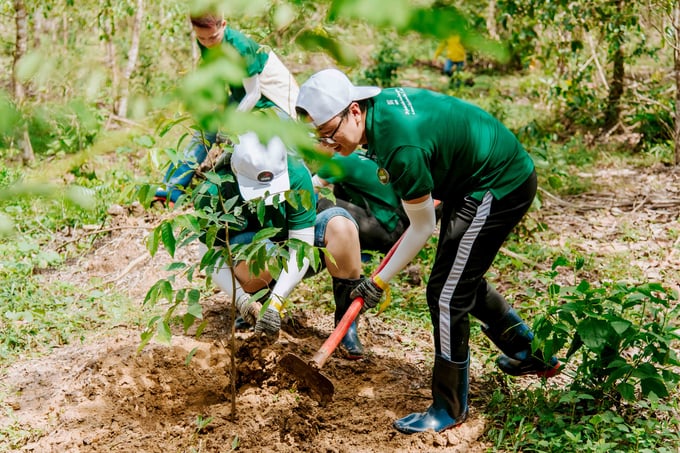June 17, 2025 | 09:48 GMT +7
June 17, 2025 | 09:48 GMT +7
Hotline: 0913.378.918
June 17, 2025 | 09:48 GMT +7
Hotline: 0913.378.918

Nestlé Vietnam provides high-quality coffee seedlings to farmers in the Central Highlands.
According to Brand Finance's 2023 Food and Beverage Industry Annual Report (a global company on brand valuation, headquartered in London, UK), Nestlé continues to be the world's most valuable food brand, with a brand value valued at up to $ 22.4 billion. At the same time, it ranked No. 1 in sustainability in the ranking of 100 food brands. In particular, the perceived value of Nestlé's sustainability is valued at up to $ 1.35 billion.
Every year, Brand Finance evaluates the 5,000 largest brands and publishes more than 100 reports, ranking brands across all fields and countries. The Top 100 strongest and most valuable Food brands in the world are included in the annual Brand Finance Food 100 ranking in 2023.
According to a report by Brand Finance, Nestlé is considered a globally sustainable corporation thanks to its commitment to the environment and social responsibility, purchasing responsibly, and supporting physical and nutritional development for consumers. Nestlé has made many important steps forward in implementing sustainable development goals.
Specifically, Nestlé is the first business in the world to be transparent about the nutritional value of all Nestlé product categories globally - based on the Health Star Rating - HSR system, to take the lead in providing delicious and nutritionally balanced meals to consumers.
Nestlé also follows the roadmap as committed to achieving the net zero emissions target by 2050 (Net Zero), and publishes a voluntary report on impacts and risks related to climate change. This shows transparency of information and consistent commitment to actions to combat climate change. The Group also implements ESG (environmental, social and governance) sustainability initiatives, contributing to providing career development opportunities for young people globally and empowering women in the workplace and the community.
In the food sector, climate change is having a growing impact, visible from farms to supermarket shelves. Drought is making food shortages in many countries increasingly severe. However, food can also impact climate change. Currently, farming production activities serving human food needs contribute to creating nearly 1/3 of greenhouse gas emissions globally.
Therefore, as the world's leading food corporation, Nestlé is making efforts to promote the transition to a regenerative food system through collaboration with farmers, suppliers, retailers and users.
In Vietnam, Nestlé is supporting farmers, contributing to the transition to regenerative agriculture in coffee farming in the Central Highlands. Through the Nescafe Plan program deployed in the Central Highlands provinces from 2011 to the present, Nestlé and farmers carry out many initiatives that contribute to improving the quality of Vietnamese coffee beans, conserve soil and biodiversity, reduce the effects of climate change, promote biodiversity and increase income for farmers.
Towards realizing the Net Zero goal, Nestlé strengthens cooperation with ministries, specialized units, business partners, and farmers to jointly implement initiatives to reduce emissions throughout the entire value chain, from input materials, and production to post-consumer product packaging.
Protecting tropical forests - the habitat of most terrestrial wild creatures - not only helps reduce the impact of climate change but also contributes to solving natural crises.
In Vietnam, it is expected that this year, Nestlé will work with partners and coffee farmers in the Central Highlands region to pilot planting of forest trees and fruit trees right on coffee fields following the agroforestry/intercropping model, aiming to plant about 2.5 million trees in the period 2023 - 2027.
When successfully implemented and achieving the expected total number of crops, the project not only brings economic value to farmers but also contributes to the absorption and storage of CO2 gas.
In 2022, Nestlé Vietnam's staff and Environmental Ambassador group in collaboration with Gaia Conservation Center organized afforestation activities to raise awareness, contribute to regeneration, recovery and regeneration of forests and ecosystems, and limit the negative impacts of climate change.
Accordingly, Nestlé contributed 1,000 large trees to Dong Nai Cultural Nature Reserve. All plants are trees that will provide valuable native timber and food for wildlife. The planted trees will be continuously monitored, observed and cared for by Gaia and Nestlé for many years to ensure good growth.
Previously, from June 2021, Nestlé launched a strategy aimed at contributing to preventing deforestation in the Group's supply chain. Preserving and restoring forests and important natural ecosystems is also part of Nestlé's roadmap to achieving net zero emissions by 2050.
Translated by Hoang Duy
/2025/06/12/3721-2-202745_83.jpg)
(VAN) TH made an impression at Seoul Food 2025 with its line of natural beverages, paving the way for Vietnamese food products to enter the South Korean market.

(VAN) Soc Trang's success in rice exports stems from a strategy of developing fragrant and specialty rice cultivation areas and standardizing production toward low-emission practices.
/2025/06/11/1311-5-120811_839.jpg)
(VAN) The pig farming industry is facing the challenge of comprehensive restructuring to meet requirements for quality, safety, traceability, and market expansion both domestically and for export.

(VAN) Vietnam considers participating in ALGROALBA in order to expand agricultural production, coordinate the assessment and effective exploitation potential land.
/2025/06/05/5314-1-184727_407.jpg)
(VAN) From seemingly worthless fish scales and skin, enzymes and lactic ferments can transform by-products into peptides, opening a sustainable, effective business direction and elevating Vietnamese seafood.

(VAN) TTC AgriS and IFC signed a strategic partnership to develop a sustainable agricultural value chain, aiming to achieve the Net Zero target by 2035.

(VAN) Seafood by-products are opening a new path, combining green growth and technological innovation to enhance the industry's value.